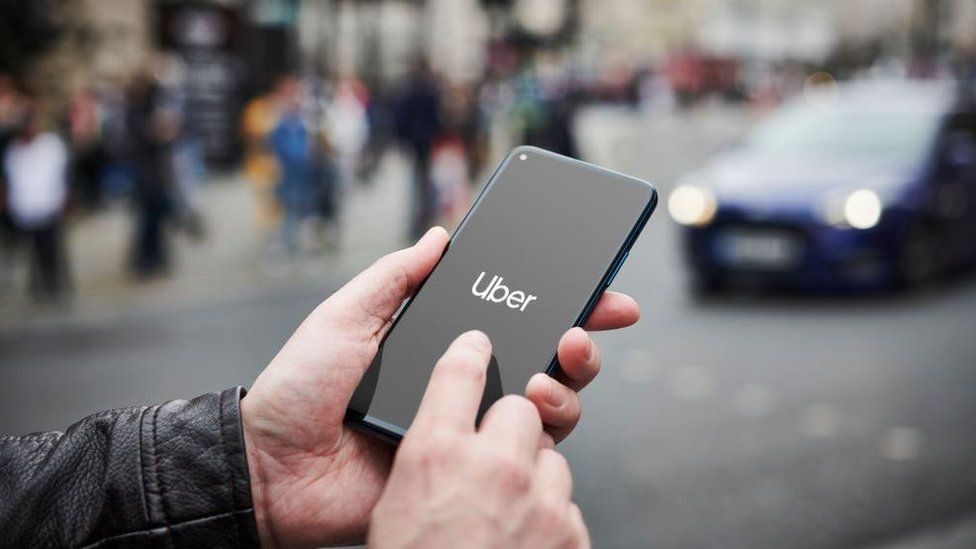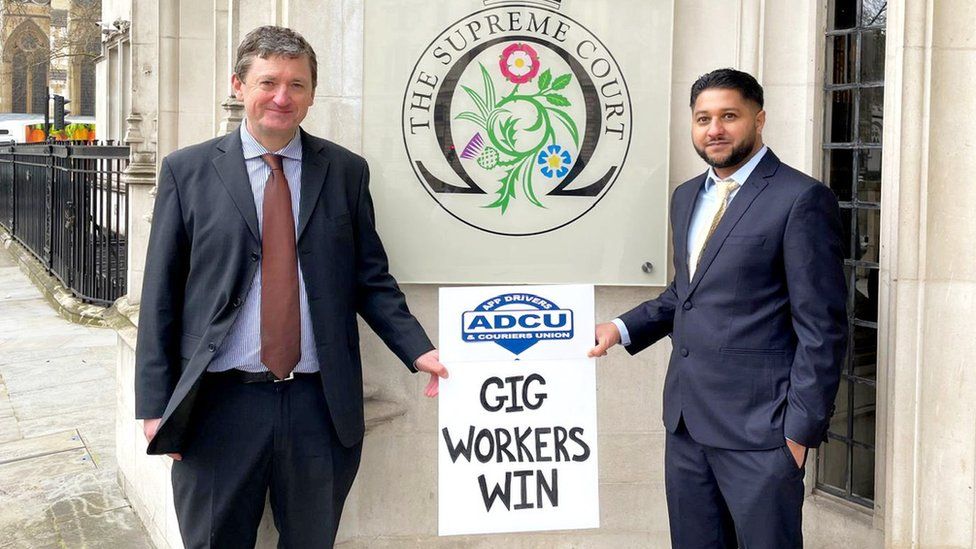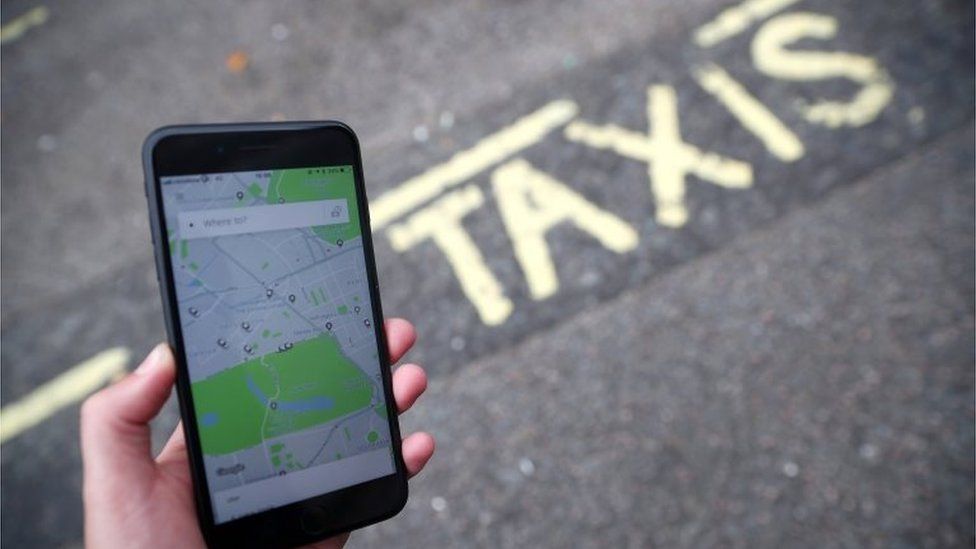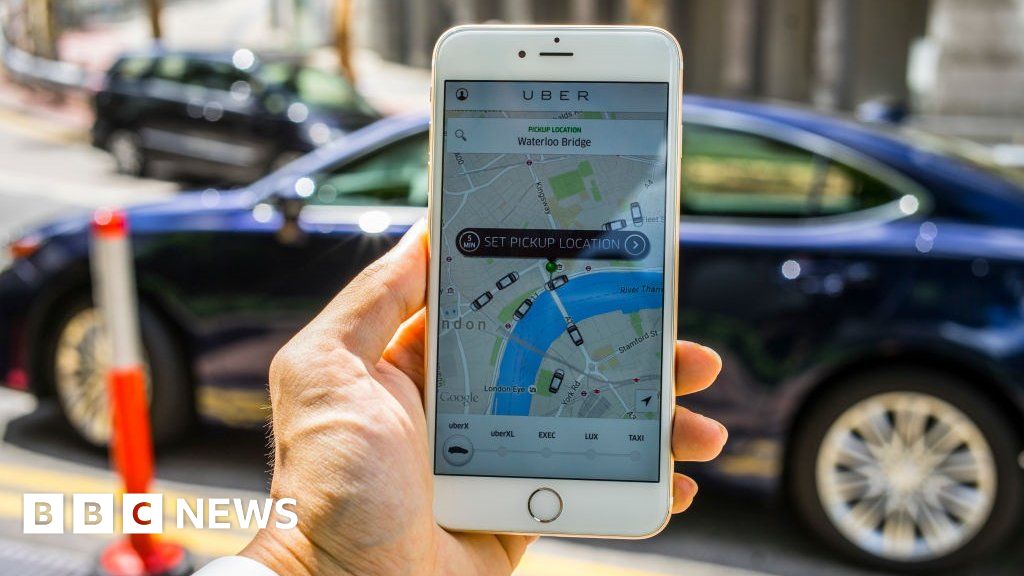
Uber says it will give its UK drivers a guaranteed minimum wage, holiday pay and pensions.
The ride-hailing app giant said drivers would earn at least the UK’s National Living Wage, paid to the over 25s, of £8.72 an hour.
It comes one month after the US firm lost a legal battle in the UK, begun in 2016, over drivers’ status.
Uber told the BBC it did not expect the change in drivers’ conditions to mean higher fares.
Union leaders and employment experts said Uber’s move would have far reaching consequences for the gig economy. Bates Wells lawyer Rachel Mathieson, who represented Uber drivers fighting for worker rights, called it “a very significant milestone”.
In last month’s Supreme Court hearing, Uber had argued it was a third-party booking agent, and its drivers were self employed.
But the court ruled its drivers were workers, a category that means they are entitled to minimum legal, holiday and pension rights.
The company is being challenged by its drivers in multiple countries over whether they should be classed as workers or self-employed.
Workers’ rights
Uber said the changes to its UK drivers’ pay would come in almost instantly, from Wednesday, and form an earnings floor, not an earnings ceiling.
The company, which says it has 70,000 drivers in the UK, said the new rates would come on top of free insurance to cover sickness, injury and maternity and paternity payments which have been in place for all drivers since 2018.
Uber says payment will kick in at:
- At least the minimum wage for over 25s, after accepting a trip request and after expenses.
- All drivers will be paid holiday time based on 12.07% of their earnings, paid out on a fortnightly basis.
- Drivers will automatically be enrolled into a pension plan with contributions from Uber alongside driver contributions, setting drivers up over the long term.
- Continued free insurance in case of sickness or injury as well as parental payments, which have been in place for all drivers since 2018.
- All drivers will retain the freedom to choose if, when and where they drive.

Jamie Heywood, regional general manager for Northern Europe at Uber, said: “Uber is just one part of a larger private-hire industry, so we hope that all other operators will join us in improving the quality of work for these important workers who are an essential part of our everyday lives.”
Uber pointed out in its statement announcing the changes that a worker is a classification that is unique under UK employment law. Workers are not full-blown employees but are entitled to the minimum wage, holiday pay and a pension.
The company said the recent UK Supreme Court ruling had provided a clearer path forward as to a model that gives drivers the rights of worker status – while continuing to let them work flexibly.
Criticism
In a long-running legal battle, Uber had finally appealed to the court after losing three earlier rounds. The Supreme Court ruled that Uber had to consider its drivers as “workers” from the time they logged onto the app, until they logged off.
This was a key point because Uber drivers typically spend time waiting for people to book rides on the app, for which they don’t get paid.

Previously, the firm had said that if drivers were found to be workers, then it would only count the time during journeys when a passenger is in the car.
James Farrar and Yaseen Aslam, the two former drivers who sued Uber over worker status, welcomed Monday’s announcement, but said the company was still “short changing” drivers.
They said the Supreme Court ruling meant drivers should get worker entitlements from when they log-on to log off. Whereas, Uber is committing only to these entitlements from the time a trip is accepted to the drop-off.
Uber drivers will “still be short-changed to the tune of 40-50%. Also, it is not acceptable for Uber to unilaterally decide the driver expense base in calculating minimum wage. This must be subject to collective agreement,” they said.
Widespread impact
Employment experts said the ramifications of Uber’s changes would be felt across the gig economy.
Mary Walker, partner and employment lawyer at law firm Gordons, said: “The resulting ability for the Uber drivers to claim back pay for minimum wage and unpaid holiday pay will have many gig businesses reviewing their practices and the associated risks as a matter of urgency.”
She believes the additional costs facing the gig economy means “some businesses will simply be unable to continue trading”. Other firms will be able to restructure, but perhaps with fewer workers, Ms Walker added.
Union leaders also warned other gig economy firms they would have to change. “This is the end of the road for bogus self employment,” said Mick Rix, general secretary of the GMB union, which has been fighting for employment rights through the courts.
“It’s a shame it took the GMB winning four court battles to make them see sense, but we got there in the end and ultimately that’s a big win for our members. Other gig economy companies should take note,” Mr Rix said.


Union reps could barely contain their delight at Uber’s announcement. After years of court battles, they portray this as a win of David over Goliath. And they are hopeful it might create a domino effect.
Other gig economy companies have likely been looking closely at the Supreme Court’s verdict in February. The fact that Uber have chosen to fundamentally change their system rather than fight on might encourage others to do the same.
Uber has disrupted markets globally; this move could have repercussions around the world.


Are you an Uber driver? Share your experiences by emailing haveyoursay@bbc.co.uk.
Please include a contact number if you are willing to speak to a BBC journalist. You can also get in touch in the following ways:
- WhatsApp: +44 7756 165803
- Tweet: @BBC_HaveYourSay
- Upload pictures or video
- Please read our terms & conditions and privacy policy
If you are reading this page and can’t see the form you will need to visit the mobile version of the BBC website to submit your question or comment or you can email us at HaveYourSay@bbc.co.uk. Please include your name, age and location with any submission.
